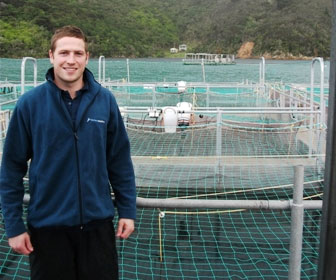|

Conor Paul, King Salmon Trial System Technician, at the experimental sea cage facility. (Photo: Skretting)
Lower-animal protein diets prove successful for salmon
 NEW ZEALAND
NEW ZEALAND
Tuesday, September 20, 2011, 03:40 (GMT + 9)
Global chinook farming leader the New Zealand King Salmon Company achieved exceptional results giving its fish diets containing only 8 per cent fishmeal. Growth in all trial groups hit the best summer commercial performance: fish doubled in size from 800g to 1,600g.
King Salmon has thus produced 1.4 kg of fish protein for every kg of fish protein in the diet.
“We wanted the trial to show whether we could use Skretting diets formulated with the MicroBalance concept to have lower fishmeal levels in order to manage diet cost in the face of rising marine protein prices,” said Mark Preece, general manager of aquaculture at the company. “Also, we are always keen to enhance the sustainability of our farming operations — which is important to us as responsible fish farmers as it is increasingly to our customers.”
The group ran the trial in the experimental sea cage facility in New Zealand’s Marlborough Sounds at its Ruakaka Seafarm, which contains nine sea pens of 125 m3, each capable of growing about 350 chinook salmon to harvest size.
Three diets were tested: a standard Skretting commercial diet at 30 per cent fishmeal and two experimental diets at 8 per cent fishmeal each. They all included animal proteins such as blood meal, but one of the two 8 per cent fishmeal diets had lower protein than the commercial diet.
To understand the performance of reduced-fishmeal diets under challenging summer conditions, the trial ran for 80 days from early December 2010 to late February 2011.
Growth and mortality were statistically equal in all three groups.
“While it is possible to make low-fishmeal diets that don’t work well, the results from this trial demonstrate there is no performance hit when using low fishmeal in summer, if the fishmeal is substituted appropriately,” commented Ben Wybourne, Skretting’s New Zealand Technical Account Manager.
Skretting researchers identified certain micro-nutrients present in fishmeal that proved to be essential to the fish, which let them find alternative sources of them.
“We can guarantee the digestible nutrient content of a diet while varying the levels of raw materials over a much wider range, according to their availability and cost,” Wybourne said.
The results will allow the company to lower fishmeal in all its production diets, Preece said, as the new method is substantially less costly.
By Natalia Real
editorial@seafood.media
www.seafood.media
Photo Courtesy of FIS Member  Skretting AS - Headquarters Skretting AS - Headquarters
|
|



